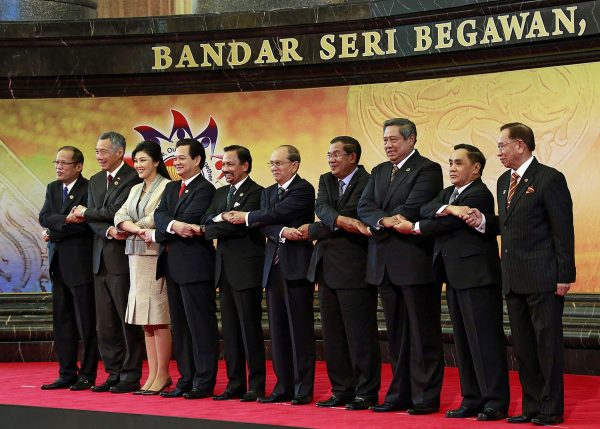Indonesia also assumes leadership on ASEAN economic matters, albeit, some would argue, not sufficiently actively. Still, at the Bali Summit in 2003, Indonesia was bold enough to introduce the establishment of an ASEAN Economic Community (AEC) by 2020 (later accelerated to 2015) as the central ASEAN objective and, more recently, during the Bali Summit in 2011, putting in place the Regional Economic Comprehensive Economic Partnership (RCEP) by 2015.
But progress toward establishing the AEC has been modest. While there have been some notable achievements, critical targets for laying a robust foundation of a fully integrated and equitable ASEAN are yet to be achieved. With 2015 now just the year after next, time is running out, and the need to address the challenges and obstacles to realising the AEC was acknowledged by ASEAN leaders at their 2012 Phnom Penh meeting.
The RCEP is a new regional trade agreement built upon the ASEAN-centered free-trade agreements (FTAs) involving, all six ASEAN dialogue partners (Japan, China, South Korea, Australia, New Zealand and India). Because of its structure, RCEP is perceived as a new trade bloc that consolidates all of ASEAN’s ‘plus-one’ FTAs, with the objective of creating a broader and deeper engagement with significant improvement over the existing FTAs. This means harmonising the trade and regulatory rules between ASEAN members and their FTA partners and minimising trade-diverting effects.
It is important for ASEAN to make convincing progress in RCEP negotiations, set conveniently to conclude and coincide with the commencement of the AEC in 2015. ASEAN has now arrived at a critical juncture where the AEC’s credibility will require ASEAN to choose the path of bold action to improve the rules governing ASEAN FTAs. This is deeply linked with RCEP’s goals, and while it is not necessary for ASEAN to first complete all of its AEC Blueprint measures to conclude the RCEP, meaningful progress, in at least some of the more difficult areas, like services liberalisation, is important. This is critical for ASEAN if it is to reach the required ASEAN common position vis-à-vis the dialogue partners for RCEP negotiations.
Moreover, deeper intra-ASEAN integration is a prerequisite for a broader East Asian integration led by ASEAN. ASEAN functions as a ‘hub’ with linkages or spokes to countries (the dialogue partners); at the same time, the hub serves as a platform for networks of production involving all countries connected through the hub (or ASEAN).
In short, now is the time for ASEAN to really focus on its economic integration agenda, and Indonesia — as the most influential country in ASEAN — should take a leading role in this.
Given the impending 2015 deadline, Indonesia should focus on issues that are difficult to solve but critical for AEC’s realisation. As a number of studies have suggested, non-tariff measures and services liberalisation stand out.
ASEAN has been successful in tariff elimination but not so in reducing barriers stemming from non-tariff measures. Significant non-tariff barriers applied by ASEAN member states can negate the positive impact of tariff elimination. And dealing with non-tariff measures is even more important, given that some of them can be used for short-term protectionist purposes, especially during downturns.
Services liberalisation, meanwhile, is critical — especially for services needed as inputs for production such as logistics, transport and business services. Probably the biggest challenge for ASEAN in services liberalisation (pursuant to the ASEAN Framework Agreement on Services) is how ASEAN member states can arrive at substantially more open commitments for foreign commercial presence in domestic economy. On this, a more open investment regime is necessary to create incentives for firms to invest across ASEAN countries.
But there are obstacles to Indonesian leadership in ASEAN too. For one, Indonesia faces a number of domestic economic challenges. Issues in infrastructure development, a high dependence on natural resources for generating income, a more rigid labor market, and continuing development gaps between regions within Indonesia are just some of the key concerns. All these are known to have eroded the country’s overall competitiveness in the past decade or so, especially in comparison with other ASEAN countries. These challenges also indicate that the country’s economic structure is (or will be) changing, and will likely still be doing so for many years to come, continuing the process started in the early 2000s.
The best way forward would be for Indonesia to engage both challenges — domestic economic reform and reform of ASEAN leadership — together. Commitment to achieving AEC and RCEP by 2015 will have the effect of instilling discipline at home for implementing the necessary domestic reforms. Even if the 2015 deadlines are not met, a decisive resolution to Indonesia’s domestic issues will benefit the country’s competitiveness, regardless of whether the region is fully integrated. At the same time, improvements to competitiveness will create momentum for increasingly bringing Indonesia into a more integrated region.
Dionisius Narjoko is a researcher at the Economic Research Institute for ASEAN and East Asia.
This article appeared in the most recent edition of the East Asia Forum Quarterly, ‘Indonesia’s choices’.

